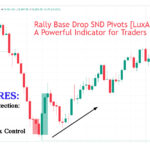
Introduction to Forex Spread
In forex trading, the spread is extremely important for your profit. Basically, the spread is the gap between the bid price (that’s what you get if you sell a currency pair) and the ask price (what you pay if you buy a currency pair). This is taken automatically when you open a trade, so the wider the spread, the more a trader has to overcome in order to make a profit. Understanding how spreads work, what affects them, and how to minimize their impact is essential for any trader who wants to get the best out of forex trading.
How the Spread Impacts Forex Trading
The majority of Forex brokers possess two main forms of spreads: fixed and variable. A fixed spread is one that does not change regardless of what is taking place in the market, ideal for traders who prefer knowing precisely how much they’re going to pay. Meanwhile, a variable spread is a flexible one that narrows when everything goes smoothly, but it widens during periods of high uncertainty or big economic events.
For instance, if the bid price for EUR/USD currency pair is 1.1000 and ask price is 1.1002, the spread would be 2 pips. If one buys at 1.1002, he or she would like the price to go above this level to cover the cost of the spread before any profit can be realized.
Factors That Influence Forex Spreads
1. Liquidity
Liquidity plays a very important role in the case of the spread size. I mean, you find that the major pairs like EUR/USD, GBP/USD, and USD/JPY have tighter spreads because they’re highly traded. On the other hand, exotic pairs like USD/TRY or GBP/ZAR have wider spreads because there’s thinner trading and they’re very volatile.
2. Market Volatility
Under major economic news releases or geopolitical events, the forex market may experience high volatility. Central bank rate calls, Non-Farm Payroll (NFP) releases, or unscheduled releases of economic data can cause spreads to widen sharply as liquidity providers move prices to manage risk.
3. When to Trade
Forex spreads also tighten when there is a lot of trading activity, like during the overlap of the New York and London markets. When trading activity slows down a bit, like during the Asian session, spreads will widen due to the decreased market activity.
4. Broker Type
The kind of forex broker you use can indeed make a huge difference in the spreads. Market makers, or dealing desk brokers, usually give you fixed spreads and deal with you directly. But ECN (Electronic Communication Network) and STP (Straight Through Processing) brokers are different; they give you variable spreads and link you directly to liquidity providers, thus you get lower but variable spreads.
Ways to Minimize the Impact of Spreads in Forex Trading

1. Choose Low-Spread Brokers
Tradingview To minimize trading costs, traders must choose brokers with competitive spreads. Some of the top forex brokers in 2025 have tight spreads, particularly on major currency pairs. With platforms such as MetaTrader 4 (MT4), MetaTrader 5 (MT5), and TradingView, traders can compare spreads in real time prior to making trades.
2. Trade When There’s Plenty of Liquidity
It is best to trade forex under low spreads when the major trading sessions are occurring, particularly when London and New York are overlapping. That way, you have tight spreads and prices of execution.
3. Use Limit Orders instead of Market Orders.
If you place limit orders instead of market orders, you will save on spread costs. Market orders fill at the best available price, but sometimes this leaves you with a less-than-perfect spread. When you use limit orders, you specify your own entry price, and this allows you to skip those extra spread costs.
4. Avoid Trading During Major News Releases
Spreads can widen significantly when big news comes out. If traders don’t wish to pay high prices, they ought to refrain from entering trades right before those significant economic releases, or they need to adjust their strategy to account for those sudden spread shifts.
5. Look at a Commission-Based Account
There are also ECN brokers that offer super-low spreads but with a commission on each trade. For some scenarios, this is actually cheaper than trading with a wider spread, particularly for scalpers and high-frequency traders.
Conclusion
Forex spread is a vital aspect of trading that directly affects the profitability of a trader. By understanding what determines spreads and implementing strategies to minimize their impact, traders can become more trading-efficient and cut down on unnecessary costs. The selection of a suitable broker, trading at optimal times, and implementing sound order execution strategies can allow traders to navigate spread-associated challenges and gain a better overall forex trading experience. Hey, whether you’re just starting out or you’ve been trading for a while, paying attention to spreads can really impact your success in the forex market in the long run.



Can I just say what a relief to find someone who actually knows what theyre talking about on the internet. You definitely know how to bring an issue to light and make it important. More people need to read this and understand this side of the story. I cant believe youre not more popular because you definitely have the gift.
Can I just say what a relief to find someone who actually knows what theyre talking about on the internet. You definitely know how to bring an issue to light and make it important. More people need to read this and understand this side of the story. I cant believe youre not more popular because you definitely have the gift.
Hiya, I am really glad I’ve found this info. Nowadays bloggers publish just about gossips and internet and this is actually annoying. A good web site with exciting content, this is what I need. Thanks for keeping this web-site, I’ll be visiting it. Do you do newsletters? Cant find it.
I like what you guys are up also. Such clever work and reporting! Carry on the excellent works guys I have incorporated you guys to my blogroll. I think it will improve the value of my website 🙂
Good write-up, I am normal visitor of one?¦s site, maintain up the excellent operate, and It is going to be a regular visitor for a lengthy time.
Good day I am so grateful I found your site, I really found you by accident, while I was searching on Askjeeve for something else, Regardless I am here now and would just like to say thank you for a remarkable post and a all round enjoyable blog (I also love the theme/design), I don’t have time to read it all at the moment but I have book-marked it and also included your RSS feeds, so when I have time I will be back to read a lot more, Please do keep up the excellent job.
Do you mind if I quote a couple of your posts as long as I provide credit and sources back to your weblog? My blog site is in the very same area of interest as yours and my visitors would certainly benefit from a lot of the information you present here. Please let me know if this okay with you. Thank you!
Hi, just required you to know I he added your site to my Google bookmarks due to your layout. But seriously, I believe your internet site has 1 in the freshest theme I??ve came across. It extremely helps make reading your blog significantly easier.
An interesting discussion is worth comment. I think that you should write more on this topic, it might not be a taboo subject but generally people are not enough to speak on such topics. To the next. Cheers
Howdy, i read your blog from time to time and i own a similar one and i was just wondering if you get a lot of spam feedback? If so how do you reduce it, any plugin or anything you can suggest? I get so much lately it’s driving me crazy so any support is very much appreciated.
Appreciating the time and effort you put into your website and in depth information you offer. It’s awesome to come across a blog every once in a while that isn’t the same out of date rehashed information. Great read! I’ve saved your site and I’m including your RSS feeds to my Google account.
Howdy! Someone in my Myspace group shared this site with us so I came to check it out. I’m definitely loving the information. I’m bookmarking and will be tweeting this to my followers! Exceptional blog and amazing design and style.
whoah this weblog is great i really like studying your articles. Stay up the great work! You recognize, lots of persons are hunting around for this info, you could aid them greatly.
When I originally commented I clicked the -Notify me when new comments are added- checkbox and now each time a comment is added I get four emails with the same comment. Is there any way you can remove me from that service? Thanks!
I am glad to be one of many visitants on this great internet site (:, appreciate it for posting.
You actually make it seem so easy along with your presentation however I find this matter to be really something which I think I might never understand. It seems too complex and extremely extensive for me. I’m looking forward in your subsequent put up, I will attempt to get the grasp of it!
Thanks for sharing. I read many of your blog posts, cool, your blog is very good.
Your point of view caught my eye and was very interesting. Thanks. I have a question for you.
I¦ll immediately snatch your rss as I can’t find your email subscription link or newsletter service. Do you’ve any? Please permit me recognise so that I may just subscribe. Thanks.